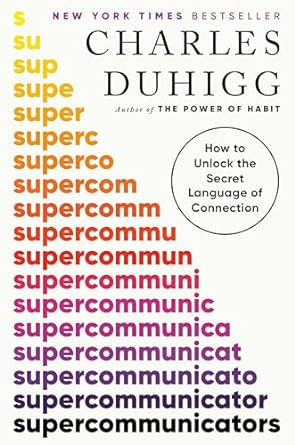I Learned How to Be a ‘Supercommunicator’
Here’s how you can be one too—without reading Charles Duhigg’s book

I’ve never read How to Win Friends and Influence People—maybe it’s too popular to appeal to me (ugh, such a snob), but I can always tell when someone else has: They use my first name a lot, smile, make direct eye contact, and really are overall more pleasant to talk to. So I guess the book works. Even though I’ve never read it, I’ve always wanted to be the kind of person who, well, wins friends and influences people.
Or at least I did.
I've come (in my old age) to realize that I prefer genuine connections with positive, interesting people who match my energy and don’t (well, hardly ever—we’re human after all) talk negatively about others. These friendships bring me much more joy and fulfillment than superficial ones. I'd rather discuss life's goals, hopes, dreams, and beliefs than make small talk about the weather, recipes, or other people.
But I guess I haven’t completely given up on my dreams of being a winner of friends and an influencer of people because I took Charles Duhigg’s Supercommunicators: How to Unlock the Secret Language of Connection out of the library a couple of weeks ago.
The book begins with a question:
Who would you call if you were having a bad day? If you had screwed up a deal at work, or had gotten into an argument with your spouse, or were feeling frustrated and sick of it all: Who would you want to talk to?
Reading this, I immediately thought of my sister. She’s the best person to talk to: patient, understanding, non-judgmental, and best of all, when I tell her what I need her to say, she’ll say it. If everyone had someone like my sister, the human equivalent of sunshine, in their lives, the world would be a way better place.
But then Duhigg continues:
Now ask yourself: Are they the funniest person in your life? (Probably not, but if you paid close attention, you’d notice they laugh more than most people.) Are they the most interesting or smartest person you know? (What’s more likely is that, even if they don’t say anything particularly wise, you anticipate that you will feel smarter after talking to them.) Are they your most entertaining or confident friend? Do you they give the best advice? (Most likely: Nope, nope, and nope—but when you hang up the phone, you’ll feel calmer and more centered and closer to the right choice.)
Hmmm. All pretty true. The question, then, is:
So what are they doing that makes you feel so good?
And that is what Duhigg comes to answer in the rest of the book: Why are some people easy to talk to, to connect with? What do they notice, intuit, and do differently than those of us who aren’t naturals at navigating conversations the way “supercommunicators” are?
Here are 4 key takeaways that I found insightful (i.e. I read the book so you don’t have to):
Understand Different Conversation Mindsets:
According to Duhigg, there are three kinds of conversation:
What’s this really about? These are practical conversations where the participants are simply discussing choices or analyzing plans.
How do we feel? These conversations focus on the emotions beneath the words. If you've ever responded to a friend's venting with advice instead of listening empathetically, you've confused a "How do we feel" conversation with a "What's this really about" conversation.
Who are we? These conversations center around the way we view ourselves and others, and the way we fit into society.
When we, for instance, gossip about office politics, or figure out the people we know in common, or explain how our religion or family background … the social mindset is constantly shaping how we listen and what we say.
Although different, these mindsets are interconnected and can shift during a conversation, according to Duhigg. For example, a discussion might start with a friend seeking help with a work problem ("What's this really about?"), then reveal feelings of stress ("How do we feel?"), and finally focus on others' reactions to the issue ("Who are we?"). Supercommunicators are good at “reading the room” and tuning into the kind of conversation happening at that moment.
Mirroring and Matching
Once the conversation type is identified, Duhigg found that most supercommunicators frequently matched or mirrored emotions to build an empathic connection with others. He suggests:
If someone seems emotional, allow yourself to become emotional as well. If someone is intent on decision-making, match that focus. If they are preoccupied by social implications, reflect their fixation back to them.
This doesn’t mean faking it or pretending to care, it is a way of showing genuine interest and compassion. There are moments in conversations when we genuinely care but feel lost for words. Understanding the underlying type of conversation can guide us through these awkward "I don't know what to say" situations.
Practice Active Listening:
Supercommunicators don’t just hear; they listen. Instead of preparing a counter-argument while someone else is speaking, they genuinely tune in. This is so hard to do (trust me, I have a hard enough time keeping track of all my counter-arguments, I have to listen as well?), but it is incredibly effective. Techniques like summarizing what the other person has said and asking for confirmation show that you’re fully engaged. This makes people feel valued and understood, fostering trust. Think of the last time someone gave you their full attention in a conversation. How did it feel?
Authenticity and Vulnerability
Duhigg found that while most people turn to logic when trying to negotiate or change someone's mind, the most useful tool in the supercommunicator’s arsenal is the ability to be authentic and vulnerable.
He highlights a physician named Rima Chamie, who convinced a deeply religious patient who rejected all vaccines to get the COVID-19 vaccine by building trust through shared values. Chamie revealed to the patient that she, too, valued faith and family, reflecting on their mutual concern for their children's health. She gently posed the question, "Maybe [God] gave us vaccines to keep us safe?" This question shifted the decision-making power to the patient, who ultimately chose to get vaccinated, thanks to their common ground.
Do you know a supercommunicator? Do they apply these practices in their conversations, or do you think it’s something else that makes them that go-to person for you and/or others?
Do you think these are worthy traits to aim for or do they seem inauthentic if used intentionally to “become a supercommunicator” and don’t come from a place of genuinely wanting to connect with people?
I’m curious to hear your thoughts so please comment or reply to this email. 🙂
Have a great week, and keep reading,
Arty
What did you read over Shabbos?
A selection of shared Shabbos reads
















So, I did my thesis on a woman named Arlene Francis. Part of her career was as a posh 1950s game show panelist on What’s My Line? where they asked yes or no questions to determine someone’s line of work. After her first few weeks on the show she complained to her husband about never having guessed any occupation correctly. “You’re not listening,” he said. “I see you and see you formulating questions in your head. And you’re not listening to any answers given. If you’re actively listening, the questions will flow naturally.”
“Supercommunicators don’t just hear; they listen.” I'm under the impression that this is quickly becoming one of the rarest traits in communication. It's wonderful that you choose to emphasize its importance, Arty. Genuine understanding requires openness and reciprocity; not merely polite gestures.